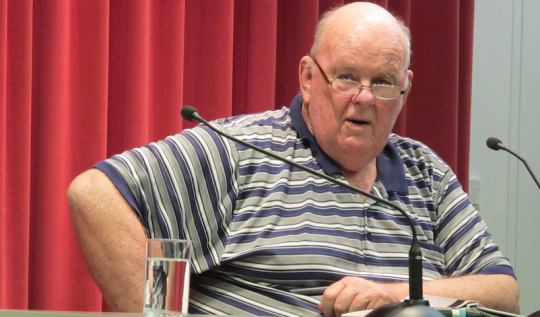The title of Les Murray’s latest collection of poems—Waiting for the Past—is tucked away in the middle of the volume in a poem on the death of his grandmother. It’s a rare prosaic poem for Murray, fittingly titled "Growth," with lines that mirror the unpredictability of his grandmother’s cancer and a young boy’s wandering in the "Cool dust of evening" in rural New South Wales, Australia:
One who’d been my friendly Gran
was now mostly barred from me,
accomplishing her hard death
on that strange farm miles away.My mother was nursing her
so we couldn’t be at home.
Dad had to stay out there, milking,
appearing sometimes, with his people,
all waiting for the past.
If not the strongest poem in the volume, it still shows flashes of Murray’s concision and eye for life’s strange, but often unnoticed, sequences ("Back, where a priest had just been / cursed out of the morphine room," he writes later in the poem, "I was hugged and laughed over / for the miles I’d covered.") It also returns to the past—like many poems in the volume—which, as the paradoxical line suggests, is as impossible as the desire is unavoidable. Whatever the future might hold—Murray is a Catholic and dedicates almost every volume "To the glory of God"—much of this life is marked by a desire to relive the past or a waiting for the present to become the past.
At 77, Murray, who is often called Australia’s greatest living poet, is more interested in returning to what remains of the past (he has suppressed almost all of his memories of his mother, he has said, after she died when he was twelve), however altered by the mind’s weaknesses or embellishments. And for him, the past is a place as much as it is people or events. In "Inspecting the Rivermouth," Murray writes:
Drove up to Hahndorf:
boiled lamb hock, great scoff!
Lamplit rain incessant.* * *
Saw careers from the climbing bridge,
the steel houses it threw
all over Hindmarsh Island,the barrages de richesse,
film culture, horseradish farms,
steamboats kneading heron-blue
Or in "Powder of Light," a poem about going to the movies as a young man, the speaker is "Hunched in the farm ute / tarpaulin against wind / the moon chasing treetops / as it yellows into night." In "Nuclear Family Bees," hunters stop by a hive in a tree trunk to
scab off single wax houses
and suck them out, as each
smallholder couple hoveredremonstrating in the air
with their life to rebuild,
new eggs, new sugarbag,gold skinfulls of water.
Of course, places tell stories, too, as we see above. A recurring one for Murray is how those in power—the beautiful, progressive elites of Western cities, for example—belittle or bully the yodels of the world. His combination of regionalisms, Aboriginal and traditional forms, and linguistic complexity may be both an assault on these sophisticates (by simultaneously speaking above and below them) and an attempt to create distinctly Australian poetry.
Large, sometimes odd, and from the sticks, Murray quickly came to see the cosmopolitan disdain of "country bumpkins," as he put it in a 2005 interview with The Paris Review, as "vile and contrary to all pretense of decency or civilization." He dropped out of The University of Sydney in the early 60s (he would eventually return to complete a BA) and hitch-hiked around the country before marrying and taking a job as a scientific and technical translator at the Australian National University in Canberra in 1963. He converted to Catholicism a year later and would eventually leave translation work for full-time writing. In 1989, he became the literary editor for the conservative Australian magazine, Quadrant. "It’s now more or less a free-speech magazine," Murray has said, "in which you don't have to toe a line; it’s also the best magazine in the country, the only one that isn’t conformist."
The sometimes jarring concision of Murray’s verse—a characteristic it shares with Gerard Manley Hopkins’s, which was important to him in his early years, and Emily Dickinson’s—also creates a sense that the world is full of unexpected pleasures and hidden terrors. "Yellow rimming the ocean," Murray writes in "The Black Beaches,"
is mountains washing back
but lagoons in cleared land often
show beaches of velvet blackpeat of grass and great trees
that were wood-fired towers
then mines of stary coals
fuming deep in dragon-holes.
Or in "The Flute," he begins:
Black night jittered sallow
blue along the south horizon
and rippled in our windows
an eerie silence in motion.
A handful of the poems deal with religious topics, and Murray regularly casts a jaundiced eye, as he’s wont to do, on modern life and its innovations. In "Eating from the Dictionary," for example, he remembers when imported chickens killed off local poultry:
Plucked chook we called Poultry, or Fowl,
a meat rare in our kitchens, crepe-skinned
for festivity or medicine.As Chooks alive, they were placid
donors of eggs and mild music
Perches and dark gave them sleep.Then came the false immigration
of millions crying in tin hell-ships
warmed all night by shit-haloed bulbs
He remembers when electricity was installed in the family farm and praises "The Privacy of Typewriters" as opposed to the computer.
But Murray is also just fun. In Waiting for the Past, there is a "nineteenth floor lover" practicing "Balconious kung fu of Shanghai," who, "heroic among consumer goods / slips off the heights of desire / down the going-home high wire." In another poem, stallions are flown to Dubai and Singapore "in single stalls / across a twilit cabin. // Intimate, under the engine’s gale." In "Diabetica," "A man coughs like a box / and turns on yellow light / to follow his bladder // out over the gunwale."
Waiting for the Past is not a culmination but a continuation of Murray’s over thirty previous volumes, and I, for one, hope the continuation continues.
